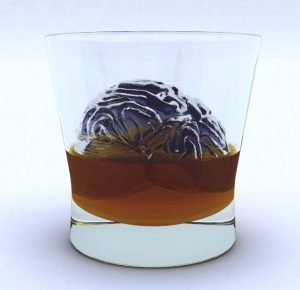 April is Alcohol Awareness Month, and it’s a good time to revisit how alcohol affects the body and the mind. Alcohol is so pervasive in our society, it is easy to forget it can be a dangerous, addictive substance. In fact, alcohol kills more people in the United States each year than heroin or prescription painkillers: nearly 88,000 people die each year from drinking compared with the 72,000 people who die of an opioid overdose.
April is Alcohol Awareness Month, and it’s a good time to revisit how alcohol affects the body and the mind. Alcohol is so pervasive in our society, it is easy to forget it can be a dangerous, addictive substance. In fact, alcohol kills more people in the United States each year than heroin or prescription painkillers: nearly 88,000 people die each year from drinking compared with the 72,000 people who die of an opioid overdose.
This is not to say that we are not in the midst of a national opioid crisis, it is simply to say it’s important to be informed and aware of the negative impacts alcohol can have on your life and your health.
Here are some startling alcohol statistics:
- Alcohol-impaired driving accounts for more than 30 percent of all driving fatalities each year.
- More than 15 million people struggle with an alcohol use disorder in the United States, but less than eight percent of those receive treatment.
- More than 65 million Americans report binge drinking in the past month, which is more than 40 percent of the total of current alcohol users.
- Teen alcohol use kills 4,700 people each year. That’s more than all illegal drugs combined.
- Drunk driving costs the United States more than $199 billion every year.
How Alcohol Affects Your Health
Alcohol affects every bodily system in some way, from the inconvenience and discomfort of a “morning after” hangover to more serious issues with major organs such as your heart, brain, liver, and pancreas.
Alcohol and the Heart
Alcohol inflames your entire system and causes an increase in blood pressure even at moderate doses. Prolonged or daily drinking can lead to several serious heart conditions, including heart arrhythmias (irregular heartbeat), cardiomyopathy (stretching and weakening of heart muscles, hypertension (chronic high blood pressure), and stroke.
Alcohol and the Liver
Prolonged and/or heavy drinking has several negative effects on the liver. Even at moderate doses, alcohol causes the liver to become inflamed, and over time the liver becomes unable to repair itself due to scarring; this is called fibrosis of the liver. Over time, the liver becomes unable to repair this scarring and causes permanent, irreversible damage and creating a potentially fatal condition called cirrhosis. Shorter-term inflammation of the liver (more common with binge or sporadic drinking) is called ‘alcoholic hepatitis’ and can lead to a myriad of other health problems as well.
 Alcohol and the Brain
Alcohol and the Brain
Alcohol interferes with all the brain’s communication pathways and can affect the way the brain looks and works. These disruptions can change mood and behavior, and make it harder to think clearly and move with coordination. Alcohol reduces inhibition, which leads to risk-taking behaviors and poor decisions. Long-term, chronic drinking can lead to a potentially fatal condition known as Wernicke-Korsakoff Syndrome (sometimes referred to as ‘wet brain’), a potentially fatal condition that causes memory loss, permanent loss of balance, confusion, and loss of mental activity.
Alcohol and the Pancreas
Alcohol causes the pancreas to produce toxic substances that can eventually lead to pancreatitis, a painful, dangerous inflammation and swelling of the blood vessels in the pancreas that prevents proper digestion. This can occur in an acute form that can be treated over time with proper care or a chronic form that is incurable and potentially fatal.
Alcohol and Mental Health
The reason people drink and the consequences of excessive drinking are directly linked to mental health. Mental health problems not only result from drinking too much alcohol, but they can also cause people to drink too much and ‘self-medicate’. When a person turns to alcohol for self-medicating purposes, they are more likely to become dependent upon alcohol than an individual who consumes alcohol without having a mental disorder. In fact, those with mental health conditions are thought to be around 50 percent more susceptible to addiction.
Alcohol and Depression
Nearly one-third of people with major depression also have an alcohol problem, and women with depression are more than twice as likely to start drinking heavily. Alcohol is a depressant, so it exacerbates any depressive symptoms a person is experiencing, and drinking excessively can even create a depressive disorder over time. Additionally, any medications taken for depression will not work effectively when under the influence of alcohol.
 Alcohol and Anxiety
Alcohol and Anxiety
Like depression, many people with an anxiety disorder seek to self-medicate with alcohol for the temporary relief from anxiety it can provide, however, the use of alcohol to decrease anxiety is a strategy that most often backfires. According to the Substance Abuse and Mental Health Services Administration (SAMHSA), anxiety is a mental health disorder that can be caused by prolonged drinking in some instances. In fact, 20 percent of people dealing with social anxiety disorder suffer from some form of alcohol abuse or dependence. Withdrawal from alcohol, even in moderate doses (a ‘hangover’), also causes a spike in anxiety which perpetuates self-medicating and the cycle continues.
Alcohol and Lifestyle
Even if you don’t drink alcohol to the point where you experience any of the more serious physical conditions above, alcohol can have a negative impact on overall health and wellbeing. People speak casually about ‘having a hangover’ – so much so that this has been commonplace – but a hangover means your body was effectively poisoned by your alcohol intake the night before and needs to repair. It causes dehydration, headaches, nausea/vomiting, poor sleep, and inhibits nutrition absorption.
The after-effects of a night of drinking often make people feel irritable, anxious, unmotivated, and tired. This can lead to poor eating habits, weight gain, lack of exercise, poor work performance, and relationship problems.
 Alcohol also leads to impulsive decisions, lower inhibitions, and risk-taking behavior that can have lasting consequences. Even one night of excessive drinking can cause memory loss (“grey-outs” or “black-outs”) and put us (and everyone around us) in significant danger. Sexually risky behavior is more common under the influence of alcohol, which can lead to STDs, pregnancy, or relationship problems.
Alcohol also leads to impulsive decisions, lower inhibitions, and risk-taking behavior that can have lasting consequences. Even one night of excessive drinking can cause memory loss (“grey-outs” or “black-outs”) and put us (and everyone around us) in significant danger. Sexually risky behavior is more common under the influence of alcohol, which can lead to STDs, pregnancy, or relationship problems.
In short – you don’t have to have substance use disorder to have alcohol negatively impact your life. A good question to ask yourself is: “Is alcohol additive in my life?”. If the answer is no, then it’s a good idea to evaluate your drinking habits and make some changes.
Alcohol and When to Get Help
The answer for when to get help for alcohol is simple: if it is chronically and negatively impacting your life in any way, it is important to get help. It is less important to focus on whether or not you have substance use disorder and more important to evaluate the ways alcohol is negatively affecting your life.
The National Insitute on Alcohol Abuse and Alcoholism has a questionnaire to help you come to the decision of whether you need help, but because it is essentially a self-diagnosed disease, simply wanting help is enough.
How Herren Wellness Can Help
We understand that early recovery – from anything – is a difficult time full of a range of emotions. We work with guests to create a whole-health action management plan, allowing them to discover and explore many opportunities in recovery. We help foster healthy habits and routines, including nutrition, fitness, sleep hygiene, creative exercises, mindfulness practices, and group activities that allow guests to reconnect with the things they love or discover new interests.
We also work with guests to create a meaningful and sustainable aftercare plan that includes healthy habits and routines that are meaningful to them. When you come to Herren Wellness, you become part of a vibrant and thriving community that doesn’t end when your stay ends. You become part of the Herren Wellness family.





